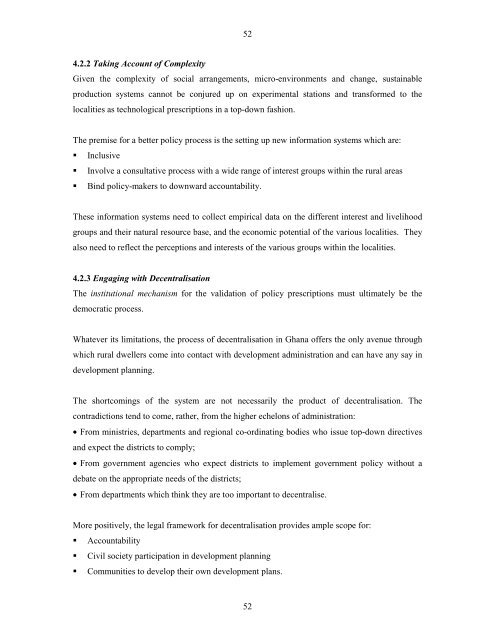Poverty Dimensions of Public Governance and Forest Management ...
Poverty Dimensions of Public Governance and Forest Management ...
Poverty Dimensions of Public Governance and Forest Management ...
You also want an ePaper? Increase the reach of your titles
YUMPU automatically turns print PDFs into web optimized ePapers that Google loves.
52<br />
4.2.2 Taking Account <strong>of</strong> Complexity<br />
Given the complexity <strong>of</strong> social arrangements, micro-environments <strong>and</strong> change, sustainable<br />
production systems cannot be conjured up on experimental stations <strong>and</strong> transformed to the<br />
localities as technological prescriptions in a top-down fashion.<br />
The premise for a better policy process is the setting up new information systems which are:<br />
! Inclusive<br />
! Involve a consultative process with a wide range <strong>of</strong> interest groups within the rural areas<br />
! Bind policy-makers to downward accountability.<br />
These information systems need to collect empirical data on the different interest <strong>and</strong> livelihood<br />
groups <strong>and</strong> their natural resource base, <strong>and</strong> the economic potential <strong>of</strong> the various localities. They<br />
also need to reflect the perceptions <strong>and</strong> interests <strong>of</strong> the various groups within the localities.<br />
4.2.3 Engaging with Decentralisation<br />
The institutional mechanism for the validation <strong>of</strong> policy prescriptions must ultimately be the<br />
democratic process.<br />
Whatever its limitations, the process <strong>of</strong> decentralisation in Ghana <strong>of</strong>fers the only avenue through<br />
which rural dwellers come into contact with development administration <strong>and</strong> can have any say in<br />
development planning.<br />
The shortcomings <strong>of</strong> the system are not necessarily the product <strong>of</strong> decentralisation. The<br />
contradictions tend to come, rather, from the higher echelons <strong>of</strong> administration:<br />
• From ministries, departments <strong>and</strong> regional co-ordinating bodies who issue top-down directives<br />
<strong>and</strong> expect the districts to comply;<br />
• From government agencies who expect districts to implement government policy without a<br />
debate on the appropriate needs <strong>of</strong> the districts;<br />
• From departments which think they are too important to decentralise.<br />
More positively, the legal framework for decentralisation provides ample scope for:<br />
! Accountability<br />
! Civil society participation in development planning<br />
! Communities to develop their own development plans.<br />
52
















